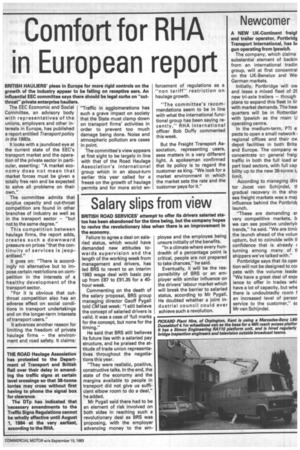Salary slips from view
Page 5

If you've noticed an error in this article please click here to report it so we can fix it.
BRITISH ROAD SERVICES' attempt to offer its drivers salaried status has been abandoned for the time being, but the company hopes to revive the revolutionary idea when there is an improvement in the economy.
Failure to agree a deal on salaried status, which would have demanded new attitudes towards supervision and the length of the working week from management and drivers, has led BRS to revert to an interim 1983 wage deal with basic pay up from £87 to £91.35 for a 40hour week.
Commenting on the death of the salary proposal, BRS group managing director Geoff Pygall told CM last week: "I still believe the concept of salaried drivers is valid. It was a case of 'full marks for the concept, but none for the timing."
He said that BRS still believes its future lies with a salaried pay structure, and he praised the attitude of trade union representatives throughout the negotiations this year.
"They were realistic, positive, constructive talks. In the end, the state of the economy and the margins available to people in transport did not give us sufficient elbow room to do a deal," he added.
Mr Pygall said there had to be an element of risk involved on both sides in reaching such a revolutionary deal as BRS was proposing, with the employer advancing money to the em ployee and the employee being unsure initially of the benefits.
"In a climate where every hundredth of a percentage point is critical, people are not prepared to take chances," he said.
Eventually, it will be the responsibility of BRS or an employer with similar influence on the drivers' labour market which will break the barrier to salaried status, according to Mr Pygall. He doubted whether a joint industrial council could ever achieve such a revolution.




























































































































